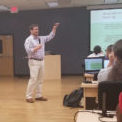Competencies
a. Roles and responsibilities related to educating counselors
b. Pedagogy and teaching methods relevant to counselor education
c. Models of adult development and learning
d. Instructional and curriculum design, delivery, and evaluation methods relevant to counselor
education
e. Effective approaches for online instruction
f. Screening, remediation, and gatekeeping functions relevant to teaching
g. Assessment of learning
h. Ethical and culturally relevant strategies used in counselor preparation
i. The role of mentoring in counselor education

Teaching Internship
During the teaching internship for COUC 970, I was able to teach COUN 505 Counseling Techniques and the Helping Relationship in the Masters program. I co-taught during the large lecture portion of the class, did teaching supervision for skills practice, and participated in online skills practice. The artifacts attached are my lesson plan evaluation, faculty feedback, and student feedback.
Meets criteria
a. b. c. d. f. g. h. i.

Teaching Practice
In fulfillment of the requirements for COUC 747 I was able to participate in teaching practice with some students learning counselor education basic skills. Attached are the lesson plan example and faculty feedback.
Meets criteria
a. b. c. d. g. h.
Philosophy of Teaching
In fulfillment of the requirements for COUC 747, the attached paper details my personal philosophy of teaching. It outlines my desire for experiential learning and how to assess learning, gate-keeping, and mentorship.
Meets criteria
a. b. f. g. h. i.
Reading Journal
In fulfillment of the requirements for COUC 747, the attached paper was a review of the reading from two assigned texts. The journal details the learning and takeaways from the learning. Feedback from the submission is also provided.
Meets criteria
a. b. c. d. e. f. g. h. i.
Teaching Experience
I was able to co-teach and facilitate several counseling courses. I was involved in grading, lesson planning, and evaluation in several course including COUC 505 Counseling Techniques and the Helping Relationship, COUC 522 Career Development and Counseling, and COUC 698 Counseling Practicum. Attached are the syllabi for all courses taught.
Meets criteria
a. b. c. d. e. f. g. h. i.
Peer Review Grading
In fulfillment of the requirements for COUC 710 Advanced Group each student had a peer review for a paper submitted for the course. Attached is my review and corrections needed for the paper given back to fellow classmates.
Meets criteria
d. e. g. i.
Reflection
It has become clearer to me through this process of my doctoral journey that teaching is a passion of mine. While I have been teaching for many years in an aviation discipline, I had never really received any advanced instruction in teaching. Therefore, developing a philosophy of teaching and learning how to communicate better was not only invaluable, but also sparked my desire to pursue this as my career. Perhaps more meaningful than any course or assignment was the interaction of my professors. I have a new desire to be to my students what they were to me.
While I have carried a knowledge of this skill for some time, it was reinforced to me through my development that I carry a strong ability to accomplish tasks and communicate good feedback to students. I make it a point to always point out the good in a student’s work and not all the bad. Many graduate students carry a struggle with imposter syndrome. While they struggle to keep their heads above water, they wonder if they even have the ability to swim. I want to encourage them and kindle their own abilities and skills to be effective counselors. I plan to carry this desire and skill into my proposed future work as a counselor educator.
Learning through many courses, teaching internship, and consultation with professors, I became aware of my struggle to deal with motivation within students. It seems to be true through my own experience that the students who are the most difficult take the most time for the teacher. Frustration can set in with these students and the thought of remediation can be difficult. However, I want to grow in my ability to intervene with these students, see remediation as a positive process, and work toward learning to personally connect with students in order to tap into their personal motivations.
My faith in Christ comes out in many areas throughout this competency. My own personal ethic goes beyond the minimum requirements in counseling. I don’t want to just “Do no harm” but rather “Love everyone.” I want to see my students grow as people, not just as counselors. Loving all of them, even the difficult students comes from my relationship with Christ and who He tells me I am. Loving my students remains my goal, but it also is continually developing along my journey.